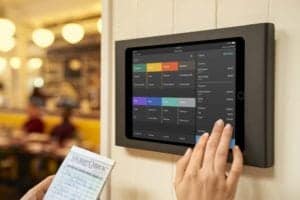See how to use your POS system to simplify tax season and take the stress out of filing.
Our content reflects the editorial opinions of our experts. While our site makes money through
referral partnerships, we only partner with companies that meet our standards for quality, as outlined in our independent
rating and scoring system.
A POS system makes tax season easier by automatically tracking your sales, expenses, and deductions. It saves time, reduces manual errors, and keeps everything organized when it’s time to file.
Don’t have a POS yet? Check out the best POS systems for small businesses to get started.
Using Your POS For Taxes
A good POS system does more than process payments. It tracks the financial data you’ll need at tax time. From income and expenses to payroll and sales tax, these POS reports help you file accurately, maximize deductions, and stay audit-ready.
| Report Type |
What It Tracks |
Why It Matters For Taxes |
| Income Reports |
Total sales minus returns |
Shows gross revenue and helps verify taxable income |
| Sales Tax Summary |
Taxes collected on transactions |
Tells you how much to remit to state/local agencies |
| Cost Of Goods Sold (COGS) |
Costs of inventory, materials, and labor |
Determines deductible expenses that lower taxable income |
| Payroll & Benefits Summary |
Wages, bonuses, and benefits |
Helps calculate deductible employee-related expenses |
Income Reports
Your POS automatically tracks every sale and return, generating income summaries for any date range.
If you sell through third-party platforms like Etsy or DoorDash, integrate them with your POS so all revenue appears in one report.
Sales Tax Summary
POS systems apply sales tax automatically based on item type and location. Your sales tax summary shows how much you’ve collected on behalf of local and state governments. This is crucial for filing accurately and avoiding penalties.
Cost Of Goods Sold Reports
COGS reports show what you spend to make or source products, including materials, packaging, and labor.
These costs are deductible and reduce your taxable income. Track them directly in your POS under inventory or purchasing.
Employee Payroll & Benefits Summary
Wages, bonuses, and benefits such as health insurance or retirement plans are tax-deductible.
Choose a POS that integrates with payroll software (or includes built-in payroll tools) so these expenses are automatically tracked.
Track Additional Expenses With Accounting Software
Most POS systems can’t capture all deductible expenses — like utilities, rent, travel, or software subscriptions — so it’s smart to integrate your POS with accounting software such as QuickBooks or Xero.
This keeps all your expenses organized and ensures nothing slips through the cracks at tax time.
How To Choose A POS System To Help With Taxes
The right POS system can simplify tax season by automatically tracking income, expenses, and deductions. When comparing options, look for software that offers strong integrations, detailed inventory tools, and employee tracking.
- Integrates with accounting software: Automatically syncs sales, labor, and inventory data to tools like QuickBooks or Xero to save time and reduce manual entry errors.
- Offers detailed inventory management: Tracks cost of goods sold (COGS), packaging, and labor to help you claim accurate deductions and prevent over- or underreporting.
- Includes employee management tools: Monitor hours, tips, commissions, and PTO directly from your POS or through HR/payroll integrations to simplify payroll tax reporting.
Want more help choosing the right POS? Check out our full guide on how to choose a POS system and our small business tax preparation checklist to make filing faster and easier.










